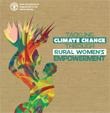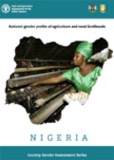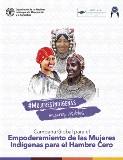Publications

Sri Lanka: Country gender assessment of agriculture and the rural sector (Country Gender Assessment Series)
02/10/2018
In FAO gender policy, a gender country assessment is one of the requirements for mainstreaming gender in national agricultural and rural development policy processes. This assessment involved a comprehensive desk review and a gap analysis, and field work that included focus group discussions, key stakeholder interviews and observations. 88 pp.

Gender Newsletter Asia Pacific, October 2018 Issue #3
01/10/2018
This newsletter provides background information regarding ongoing activities in specific countries and at the regional level on gender including success stories from Vanuatu, Afghanistan and Pakistan, empowering activities from indigenous women in the Phillipines, Zero Hunger challenges for women in Pakistan and empowering strategies in Balochistan through Agricultural Enterprise Development. 11 pp.

The Philippines: Country gender assessment of agriculture and the rural sector (Country Gender Assessment Series)
10/09/2018
This assessment identifies gender inequalities in access to critical productive resources, assets, services and opportunities in the Republic of the Philippines. In particular, it identifies priorities and gaps in selected areas of FAO mandate. At the same time, it highlights opportunities for promoting gender equality in agriculture and rural development as well as strengthening rural women’s social and economic empowerment. 72 pp.

Tackling climate change through rural women's empowerment
07/09/2018
Women play an important role in climate change adaptation and mitigation given their wide-ranging functions in the agricultural sector and in livestock, fisheries, energy, forestry, water and land management sectors. This brochure provides an overview of the gender-differentiated impacts of climate change, particularly in rural areas. 20 pp.

Nigeria: National gender profile of agriculture and rural livelihoods (Country Gender Assessment Series)
06/09/2018
This gender-based analysis of Nigeria’s rural sector reveals gender disparities in access to critical agriculture and rural resources, knowledge, opportunities, services and markets. It explores the existing gender relations and gaps in the various sub sectors of agriculture, and their possible causes and impact on food and nutrition security, and makes policy recommendations to address them. 96 pp.

Gender opportunities and constraints in land-related agricultural investments: Synthesis report
05/09/2018
This report illustrates best practices by private enterprises and other stakeholders that foster more gender-equitable agricultural investments, for example the ITFC experience in Ghana, where women were given communal land for mango cultivation. 84 pp.

Georgia: Gender, agriculture and rural development (Country Gender Assessment Series)
04/09/2018
The report argues that the gender gap in the county still persists, mostly in rural areas, where the role of women is hardly recognized, and calls for inclusive rural development strategies to challenge structural social barriers that limit women's economic empowerment. 84 pp.

Indigenous women, visible women: Global Campaign for the Empowerment of Indigenous Women for Zero Hunger
03/09/2018
In order to leave no one behind in the implementation of the 2030 Agenda, it is essential to make indigenous women visible: visible in data and information, visible in political decisions, and visible in public policies. This brochure provides and overview of key messages and information relating to the Global Campaign for the Empowerment of Indigenous Women for Zero Hunger. 4 pp.
